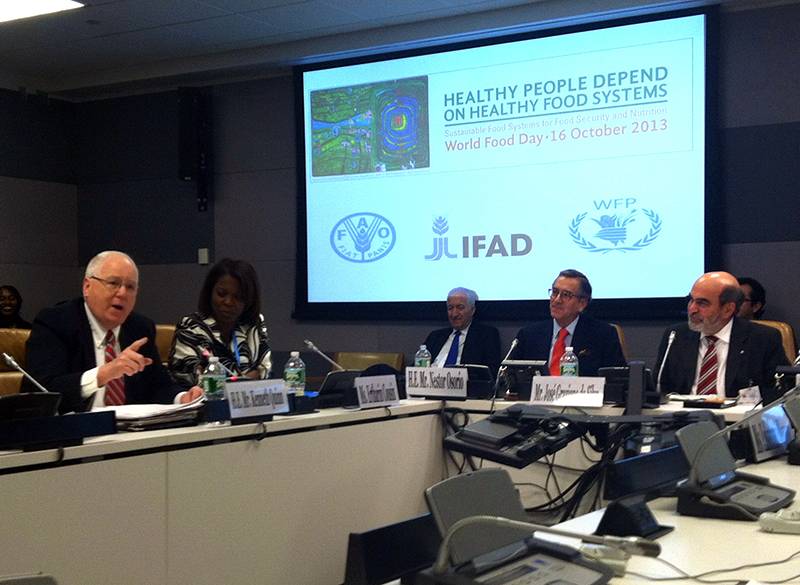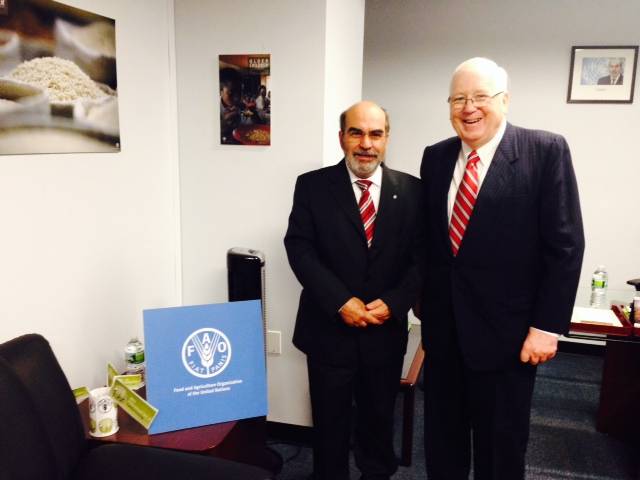Search
11/23/2013
“The Single Greatest Challenge in Human History”
“The Single Greatest Challenge in Human History”
 |
| Amb. Quinn speaks at the UN World Food Day Observance in New York |
 |
| Amb. Quinn meets with UN FAO Director General Jose Graziano da Silva |
November 23, 2013
Keynote Address by Ambassador Kenneth M. Quinn, President, The World Food Prize Foundation, at the observance of United Nations World Food Day, hosted by the Food and Agriculture Organization of the United Nations at the United Nations Headquarters, New York (As prepared for delivery)
Yesterday, November 22, was a day of exhilaration at the United Nations as the Food and Agricultural Organization and other UN agencies inaugurated the International Year of Family Farming. But, it was also a day during which Americans recalled the tragic assassination of President John F. Kennedy. In looking back 50 years, it seemed appropriate to note that on June 4, 1963, five months before he died, President Kennedy addressed the UN-FAO organized World Food Congress, a global conference that attracted huge international press coverage. In his remarks, the President said – “We have the ability, we have the means, we have the capacity to eliminate hunger from the face of the earth in our lifetime. We only need the will.”
That same summer, the UN FAO took another step that received no media attention, but ended up changing the world. It had reached out to a little known agricultural scientist working in remote villages of the Yaqui Valley in Mexico, and now urged him to travel to South Asia, which at that time faced the specter of extreme food deficits that could result in hundreds of millions facing famine, starvation and death. His name was Norman Borlaug, born and raised in my home state of Iowa, and he brought with him a miracle wheat variety he had developed that was disease resistant and produced triple the yield. When transplanted to India and Pakistan it allowed both countries to achieve self-sufficiency, and then surpluses in food production in just a few years. It was the beginning of the Green Revolution, which would eventually lead to Borlaug receiving the Nobel Peace Prize in 1970, and being heralded as the man who saved more lives than any other person who has ever lived.
As a young development adviser in a remote village in the Mekong Delta during that same period, I was personally involved in facilitating the miracle rice that had been developed in the Philippines and which had the same impact throughout Southeast Asia, as Borlaug’s wheat did. I learned of the transformative power of rural roads in bringing this new technology to family farmers and in building healthy food systems. I take great pride in having served as a "foot soldier in the Green Revolution.”
Mr. Director General, it should be a matter of great pride to you and everyone at the FAO that it was your organization that provided that critical connection to Dr. Borlaug that would lead to the single greatest period of food production and hunger reduction in all human history.
But now, 50 years later, we again need Dr. Borlaug’s legacy and the critical leadership of the United Nations, for in the coming decades we must confront the single greatest challenge in all human history: whether we can sustainably feed the more than 9 billion people who will be on our planet by the year 2050. Greater than going to the moon; greater than preventing nuclear war; greater than curing cancer. Indeed, I would argue it is the most difficult issue ever confronted by the United Nations.
Dr. Norman Borlaug said that “Food is the moral right of all who are born into the world.” Because he believed that, he created the World Food Prize that I head in 1986 with the hope that it one day might come to be seen as the "Nobel prize for food and agriculture." He vision was that it would recognize and inspire those breakthrough achievements that would allow us to meet this greatest challenge.
Each year we present our $250,000 award to an individual who has made a breakthrough achievement in increasing the quality or availability of food in the world. The ceremony takes place as part of our Borlaug Dialogue symposium which draws over 1100 people from 60 to 70 countries to Des Moines. It has been referred to by international experts as "the premiere conference in the world on global agriculture." And we have a Global Youth Institute, with over 150 high school students and teachers, because Dr. Borlaug believed that inspiring the next generation was one of his and our most important missions.
In the 15 years since I assumed leadership of the World Food Prize, we have endeavored to maintain and build upon this special connection to the United Nations.
• In 2000 as United Nations launched the Millennium Development Goals, I brought the World Food Prize to New York for a special event with the President of the General Assembly to introduce our World Food Prize Laureates – Dr. Evangelina Villegas of Mexico and Dr. Surinder Vasal of India.
• One year later, it was two World Food Prize Laureates, Dr. M.S. Swaminathan of India and Dr. Pedro Sanchez a native of Cuba, who were appointed the cochairs of the UN Hunger Task Force.
• In 2003, the World Food Prize was awarded to Undersecretary General Catherine Bertini for her role in leading the UN World Food Program, the single most effective organization in history in delivering food to hungry and starving people all around the globe. And it has been my great privilege to see my friend Ambassador Ertharin Cousin for whom I have enormous respect, continue that inspired leadership.
• One of the most significant moments of this special connection came in 2011 as we presented the World Food Prize to two former presidents: His Excellency John Kufuor of Ghana and His Excellency Luiz Inácio Lula da Silva of Brazil, for their magnificent leadership in propelling their countries to attain Millennium Development Goal Number One – reducing hunger and poverty by 50% prior to the 2015 target date. They had demonstrated that will that President Kennedy spoke of.
Mr. Director General, I well recall your personal participation in our symposium and the discussion of the Zero Hunger program that President Lula had pioneered and in which you had provided critical leadership in structuring and implementing it. And now the momentum of that achievement has been carried over and adopted by Secretary-General Ban Ki-moon. Zero Hunger will mean Zero Malnutrition and Zero Stunting.
Dr. Borlaug passed away in 2009. His very last words were “Take it to the farmer.” In recognition of Dr. Borlaug’s great accomplishments, following his death, the UN-FAO presented to his family its highest honor – the Agricola Award.
World Food Prize laureates have been building healthy food systems and taking their achievements to farmers: including uplifting poor women through aquaculture in Bangladesh and Laos, eradicating cattle plague in Africa, initiating reformed agricultural policies in Egypt and China, developing new high yielding sorghum and rice in Ethiopia and Sierra Leone, advancing agro ecology in Kenya, promoting micronutrients in Guatemala, and developing the storage and technology to reduce post-harvest waste and permit the shipment of nutritious fruits and vegetables between South America and Europe.
In 2013, we honored three of the pioneers of agricultural biotechnology whose new seeds are being used by over 17 million farmers worldwide, 90 percent of whom are small resource-poor farmers in developing countries. Biotechnology and genetic modification continue to be controversial issues. But it was the view of Dr. Borlaug that if we want to have healthy food systems and enhanced nutrition, we must ensure that all of the tools of that science will be available to the family farmer. For it will be those smallholder farmers, those poor women farmers who will be most severely impacted by the droughts and the floods and the intruding salt water from the rising seas, caused by increased climate volatility. And it is the new genetically enhanced seeds that offer these family famers the chance to overcome these ecological impediments.
I want to conclude by recalling a story that Dr. Borlaug told me when we were together in Oslo in 2001 on the 100th anniversary of the Nobel Peace Prize. When he was a young boy he attended elementary school in a small one room schoolhouse. Dr. Borlaug recounted that about half of the students were of Norwegian heritage who followed the Lutheran religion, while the other half of the class were Czech or Catholic immigrants. These were very big differences in 1920 America. Dr. Borlaug said that each morning the students would all be made to stand up and sing together about the one thing they have in common – being from their new home state of Iowa. They would sing the Iowa Corn Song which was Dr. Borlaug’s favorite song in the whole world. They came to see that the others were not so bad. He learned the lesson of his life: people who could stand and sing together and work together could live in peace together.
I saw this lesson in practice in October 2012 when my foundation had the extraordinary privilege to host Secretary-General Ban Ki-moon and Ambassador Ertharin Cousin, at our Laureate Award Ceremony in Des Moines as we celebrated United Nations World Food Day. It was a ceremony at which we were honoring Dr. Daniel Hillel, the Israeli pioneer in the field of micro irrigation who, as a result of his work in Palestinian villages and throughout the Middle East, had been nominated for our Prize by individuals from three Arab countries. As the ceremony concluded, I introduced a UN-FAO Ambassador of Goodwill, a young Israeli performer named Noa, who sang a song from her Yemini family roots. As she sang, the audience stood to applaud, including the Secretary-General and Mrs. Ban, Ambassador Cousin, Princess Haya bint Al Hussein, a UN Messenger of Peace from Dubai, His Excellency Sheikh Hamad Al-Thani, the Deputy National Food Security Director of Qatar, standing next to a senior Israeli diplomat. All of this took place in Iowa at the same time there was considerable fighting and violence in Gaza.
More than anything else it demonstrated that the World Food Prize and the United Nations can bring individuals and countries together across even the broadest political, ethnic, national or diplomatic differences, when our common goal is to alleviate hunger and human suffering.
Mr. Director General, Excellencies, ladies and gentlemen, 2014 is the year of Family Farming but is also the year in which we will celebrate the 100th anniversary of Norman Borlaug’s birth. This is a powerful combination. I believe Dr. Borlaug’s spirit is here with us today, and that he is telling us there is no time to lose. He is telling us to inspire that next generation; he is telling us to build those roads and that information infrastructure, so that we can “Take it to the farmer”; and he is telling us that this meeting room is our one room schoolhouse, where the members of the United Nations, so different in so many ways, can come together and, at last, find the will to ensure a sustainable and nutritious and healthy food system for all of the people of our planet. Dr. Borlaug is telling us just what President Kennedy told the UN World Food Congress in 1963: that if we have the will, we can overcome that greatest challenge in human history, and forever eradicate hunger, poverty and malnutrition from the face of the earth.
# # #


